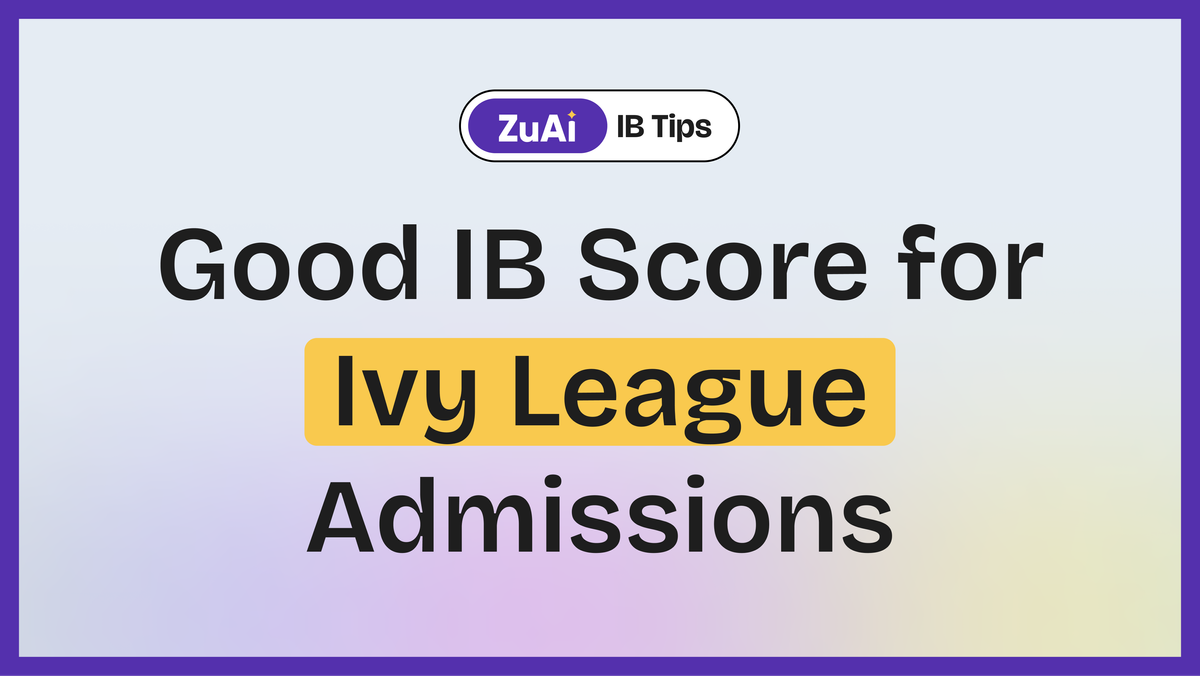What is a Good IB Score for Ivy League Admissions?

If you're aiming for Ivy League universities, you might be wondering, "What is a good IB score for Ivy League admissions?" This guide will help you understand the requirements and how to achieve the best possible score in a friendly and easy-to-understand way. Let's dive in!
Understanding the IB Scoring System
How is the IB Score Calculated?
The International Baccalaureate (IB) program scores students on a scale of 1 to 7 for each subject. Students take six subjects, giving a maximum possible score of 42 points. Additionally, students can earn up to 3 extra points from their Extended Essay (EE) and Theory of Knowledge (TOK) assessments, making the total possible score 45 points.
What is a Good IB Score for Ivy League?
To be competitive for Ivy League schools, a good IB score is generally considered to be 38 or higher. Here's a more detailed breakdown:
- 35-37: Competitive, but might need exceptional extracurriculars and recommendations.
- 38-40: Very competitive, with strong academic standing.
- 41-45: Excellent, with a strong chance of admission if other aspects of the application are also strong.
Why is a Good IB Score Important for Ivy League Admissions?
College Admissions
Ivy League schools are known for their rigorous admissions process. High IB scores demonstrate your ability to handle challenging coursework, which is a key factor in the admissions decision. These schools value academic excellence and look for students who have consistently performed well.
Scholarships and Advanced Placement
High IB scores can also make you eligible for scholarships and advanced placement in university courses. Many Ivy League schools offer college credits for high scores in higher-level (HL) courses, allowing you to skip introductory classes and save on tuition fees.
Tips to Achieve a Good IB Score
1. Stay Organized and Manage Your Time
Effective time management is crucial in the IB program. Use planners or digital tools to keep track of deadlines, assignments, and exam dates. Prioritize tasks to ensure that you're staying on top of your work.
2. Understand the Assessment Criteria
Familiarize yourself with the assessment criteria for each subject. Knowing what examiners are looking for can help you tailor your work to meet those standards and maximize your scores.
3. Seek Help When Needed
Don't hesitate to ask for help from teachers or peers if you're struggling with a topic. Study groups can provide additional support and motivation, and tutoring can offer targeted assistance.
4. Practice with Past Papers
Regularly practicing past exam papers can help you get used to the format and timing of the exams. It also highlights areas where you need improvement, allowing you to focus your study efforts more effectively.
Bonus Tip: AI app for IB Exams = ZuAI
It's the ultimate AI app designed to help your child excel in their IB exams. As a parent, you want the best for your child, and so do we.
ZuAI provides personalized study support, practice questions, and detailed explanations tailored specifically to the IB curriculum.
Think of it as a smart tutor that understands your child’s unique learning needs, helping them tackle challenging subjects with confidence.
With ZuAI, you can feel reassured knowing your child is getting the extra help they need to succeed and build a bright future.
We genuinely care about your child's success and are here to support them every step of the way.
FAQs
What is the Average IB Score for Ivy League Admissions?
The average IB score for students admitted to Ivy League schools typically ranges from 38 to 42. Achieving a score within this range, along with strong extracurriculars and recommendations, can significantly enhance your application.
Is 35 a Good IB Score for Ivy League?
A score of 35 is considered competitive, but you will need strong extracurricular activities, leadership roles, and outstanding recommendations to enhance your application.
How Can I Convert My IB Score to a GPA?
While there's no direct conversion, a score of 7 in an IB subject is often equated to an A or A+ in traditional grading systems. Most Ivy League schools consider a high IB score equivalent to a high GPA.
Do Ivy League Schools Prefer IB or AP?
Ivy League schools do not explicitly prefer one program over the other. Both IB and AP are rigorous and demonstrate a student's ability to handle challenging coursework. The key is to excel in whichever program you choose.
What Other Factors Do Ivy League Schools Consider?
In addition to high IB scores, Ivy League schools look for strong extracurricular involvement, leadership roles, personal essays, and recommendations. They seek well-rounded students who have made significant impacts in their communities.
